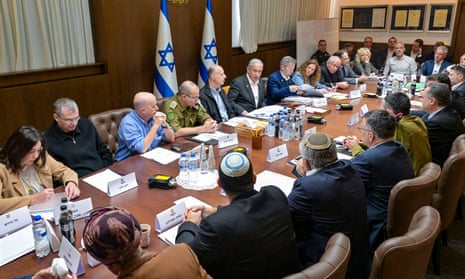

Israel’s security cabinet met before full cabinet on Friday. Photograph: GPO/AFP/Getty Images
Show key events only Please turn on JavaScript to use this feature
Live feed
Netanyahu's office says government approves Gaza ceasefire and hostage deal
Benjamin Netanyahu’s office said the Israeli government has ratified the Gaza ceasefire and hostage return deal after a cabinet meeting that lasted more than six hours and ended in the early hours of Saturday.
Under the deal, bitterly opposed by some cabinet hardliners, a six-week ceasefire is due to start on Sunday with the first of a series of hostage-for-prisoner exchanges that could open the way to ending the 15-month war in Gaza.
Key events Show key events only Please turn on JavaScript to use this feature
The Israeli government has ratified a ceasefire deal to exchange dozens of hostages held by Hamas for Palestinians in Israeli jails and pause the 15-month war in Gaza for an initial six weeks, writes Lorenzo Tondo and Bethan McKernan.
Under the deal, approved after a cabinet meeting that ended in the early hours of Saturday, a six-week ceasefire will take effect on Sunday, though key questions remain, including the names of the 33 hostages to be released during the six-week first phase of the ceasefire and who among them is still alive.
“The government has approved the hostage return plan”, the office of Prime Minister Benjamin Netanyahu said in a statement.
The agreement, which was earlier approved by the security cabinet, came despite an unexpected delay on Friday that sparked fears that last-minute disagreements between Israel and the Palestinian militant group might scuttle the agreement.
Far-right members of the coalition government of the Israeli prime minister, Benjamin Netanyahu, had threatened to vote against the deal or quit the government, potentially derailing months of work to end the conflict.
The war between Israeli forces and Hamas has razed much of Gaza, killed more than 46,000 people and displaced most of the enclave’s pre-war population of 2.3 million several times over, according to local authorities.
In Gaza on Friday, Israeli warplanes kept up heavy strikes, and the Palestinian civil emergency service said 116 Palestinians, almost 60 of them women and children, had been killed since the deal was announced on Wednesday.
Under the six-week first phase of the three-stage deal, Hamas will release 33 Israeli hostages, including all women, children, and men over 50.
Israel will release all Palestinian women and children under 19 detained in Israeli jails by the end of the first phase.
Netanyahu's office says government approves Gaza ceasefire and hostage deal
Benjamin Netanyahu’s office said the Israeli government has ratified the Gaza ceasefire and hostage return deal after a cabinet meeting that lasted more than six hours and ended in the early hours of Saturday.
Under the deal, bitterly opposed by some cabinet hardliners, a six-week ceasefire is due to start on Sunday with the first of a series of hostage-for-prisoner exchanges that could open the way to ending the 15-month war in Gaza.
Israeli cabinet 'approves Gaza hostage and ceasefire deal'
Israel’s Cabinet has approved a deal for a ceasefire in Gaza and the release of dozens of hostages.
Twenty-four ministers voted in favour and eight ministers voted against it, an Axios reporter said on X, citing an Israeli cabinet member.
Summary of the day so far
It’s 1am in Gaza and Tel Aviv. Here’s a recap of the key developments:
-
Israel’s full cabinet has been meeting for more than five hours to consider the Gaza ceasefire and hostage release deal, after the smaller security cabinet voted to approve the deal earlier today. The Israeli high court is still scheduled to hear petitions against elements of the agreement, but it is widely expected not to intervene. Hardline national security minister Itamar Ben-Gvir, who on Thursday threatened to quit the government if it ratified the agreement, urged his allies to stop the deal ahead of the full cabinet meeting.
-
Israel’s foreign minister, Gideon Sa’ar, said he voted for the deal during the security cabinet meeting earlier on Friday. In a Facebook post, Sa’ar wrote that he and fellow Knesset member Ze’ev Elkin would support the deal in the full cabinet meeting. Education minister Yoav Kisch said he voted to approve the Gaza ceasefire deal despite the “heavy price”. “We have an ultimate moral obligation to return our brothers and sisters home,” Kisch said.
-
More than 115 Palestinians have been killed in Gaza since the ceasefire deal was announced on Wednesday, the Palestinian health ministry said on Friday. Since Wednesday night, 116 Palestinians were killed, 62 of them women and children, said a spokesperson for Gaza’s civil defence agency. Gaza’s health ministry said at least 46,876 people have been killed and 110,642 injured in more than 15 months of war between Israel and Hamas.
-
The Palestinian Authority is ready to assume “full responsibility” in postwar Gaza, president Mahmoud Abbas said in his first statement since a ceasefire deal was announced. This would include the return of displaced people, providing basic services, crossings management and reconstruction of the war-torn territory, a statement from the Palestinian presidency reads.
-
Negotiators from Egypt, Qatar, the US and Israel have agreed on “all necessary arrangements to implement” the Gaza ceasefire deal, Egyptian media reported. During Friday’s talks, which reportedly ended “on a positive note”, negotiators agreed to form a joint operations room in Cairo to “ensure effective coordination” and compliance with the truce terms, it said.
-
Under the first phase of the ceasefire deal, which is to last 42 days and take effect from Sunday, Hamas has agreed to release 33 hostages including children, women – including female soldiers – and those aged over 50. In exchange, Israel will release 50 Palestinian prisoners for every female Israeli soldier released by Hamas, and 30 for other female hostages. France’s president, Emmanuel Macron, said French-Israeli citizens Ofer Kalderon and Ohad Yahalomi are in the first group of hostages to be freed by Hamas.
-
Israel’s justice ministry released a list of 95 Palestinians held in Israeli prisoners to be freed in the first exchange, including 25 male prisoners, all under the age of 21, and 70 female prisoners. One of the most well-known individuals on the list is Palestinian parliament member and feminist lawmaker Khalida Jarrar.
-
The head of the UN’s agency for Palestinian refugees (Unrwa), Philippe Lazzarini, welcomed the ceasefire but warned that it was “only a starting point”. Lazzarini, in a press briefing on Friday, called for a “rapid, uninterrupted and unhindered” humanitarian access to the “tremendous suffering” in Gaza. He also noted that the Israeli Knesset’s legislation barring the UN agency will come into effect in less than two weeks, warning that it would be “catastrophic” for Gaza and “irreversibly harm the lives and future of the Palestinians”. UK lawmakers warned on Friday that an Israeli ban on Unrwa threatens to undermine efforts for peace in the Middle East.
-
Aid agencies have warned of obstacles for life-saving aid to reach Palestinians, from destroyed infrastructure, massive need and collapsed law and order. A UN official called it “a moment of hope and opportunity” but said “we should be under no illusions how tough it will still be to get support to survivors”. On the ground in the territory, where nearly all 2.4 million people have been displaced at least once, aid workers worry nothing will be enough to meet the need.
-
International criminal court (ICC) prosecutor, Karim Khan, defended his decision to bring war crimes allegations against Israel’s prime minister, saying Israel had made “no real effort” to investigate the allegations itself. In an interview with Reuters, he stood by his decision over the arrest warrant despite a vote last week by the US House of Representatives to sanction the ICC in protest, a move he described as “unwanted and unwelcome”.
-
The Committee to Protect Journalists (CPJ) said it was “concerned” after two journalists were forcibly removed from a US state department briefing after interrupting a press conference by the US secretary of state, Antony Blinken, on Thursday. “Criminal! Why aren’t you in The Hague?” Independent journalist Sam Husseini shouted at Blinken during the unusually chaotic briefing.
-
UN secretary-general António Guterres urged an end to Israel’s “continued occupation” and “military operations” in south Lebanon, after a November ceasefire to end fighting between Israel and militant group Hezbollah. “The continued occupation by the Israel [military] inside the Unifil area operations and the conduct of military operations in Lebanese territory are violations of resolution 1701 … They must stop,” he said on Friday, referring to the UN security council decision that ended a 2006 war between both sides.
-
A former US intelligence official pleaded guilty to leaking highly classified documents detailing Israel’s plans for military attacks on Iran. Asif Rahman, who worked for the Central Intelligence Agency (CIA) since 2016, faces up to 20 years in prison after he pleaded guilty in a federal court in Virginia to two counts of willful retention and transmission of national defense information.
We reported earlier that Israel’s justice ministry has published a list of 95 Palestinians held in Israeli prisoners who are set to be released during the first stage of the ceasefire.
On the list are 70 female prisoners and 25 male prisoners, according to Associated Press. The male prisoners are all under the age of 21, the youngest just 16 years old.
They have been accused of crimes including incitement, vandalism, supporting terror, terror activities, attempted murder or throwing stones or molotov cocktails.

One of the most well-known individuals on the list is Palestinian parliament member and feminist lawmaker Khalida Jarrar.
Jarrar, 61, is a prominent figure in the Popular Front for the Liberation of Palestine (PFLP), a faction in the Palestine Liberation Organisation, who was arrested by the Israeli army on 26 December, and has been detained without trial since then.
Human Rights Watch has called Jarrar’s arrests part of Israel’s wider crackdown on non-violent political opposition.
The Committee to Protect Journalists (CPJ) said it is “concerned” after two journalists were forcibly removed from a US state department briefing after interrupting a press conference by the US secretary of state, Antony Blinken, on Thursday.
“Criminal! Why aren’t you in The Hague?” Independent journalist Sam Husseini shouted at Blinken during the unusually chaotic briefing.
Husseini was picked up by security personnel and carried out of the room as he continued to heckle Blinken.
In a statement, the CPJ said:
While we do not condone the interruption of the press conference, forcibly removing the reporters undercuts the United States’ support for freedom of the press at home and abroad.
Israel’s education minister, Yoav Kisch, said he voted to approve the Gaza ceasefire deal, describing his decision to do so as “complex”.
“The price of the deal is very heavy,” he posted to X. “But we have an ultimate moral obligation to return our brothers and sisters home.” He added:
It’s important for me to make it clear – we are not moving away from the goals of the war, no matter how long it takes – the return of all our hostages home, the collapse of the Hamas regime and the assurance that Gaza will not pose a threat to the State of Israel.
Negotiators from Egypt, Qatar, the US and Israel have agreed on “all necessary arrangements to implement” the Gaza ceasefire deal, Egyptian media is reporting.
During Friday’s talks, which reportedly ended “on a positive note”, negotiators agreed to form a joint operations room in Cairo to “ensure effective coordination” and compliance with the truce terms, AFP reported, citing Egyptian media.
The room will include representatives from Egypt, Qatar, the US, Israel and the Palestinian territories, it said.
The agreement comes within the framework of efforts made to ensure the cessation of escalation and achieve long-term stability in the Gaza Strip, an Egyptian official told the BBC.
Israeli foreign minister says he will vote in favour of ceasefire
A meeting of Israel’s full cabinet to discuss and vote on the hostage deal is still ongoing after several hours, according to Israeli media reports.
Israel’s security chiefs have finished briefing the cabinet on the deal, the Times of Israel is reporting, citing Kan news.
Some of the ministers have decided to submit their votes early rather than wait until the end of the meeting to do so, it reports.

Foreign minister Gideon Sa’ar has confirmed that he voted for the deal during the security cabinet meeting earlier on Friday.
In a Facebook post, Sa’ar wrote that he and fellow Knesset member Ze’ev Elkin will support the deal in the full cabinet meeting.
A former US intelligence official has pleaded guilty to leaking highly classified documents detailing Israel’s plans for military attacks on Iran.
Asif Rahman, who worked for the Central Intelligence Agency (CIA) since 2016, faces up to 20 years in prison after pleaded guilty in a federal court in Virginia to two counts of willful retention and transmission of national defense information.
The documents related to Israel’s military planning for a retaliatory strike on Iran following the 1 October missile barrage that was Tehran’s largest-ever assault on its regional foe.
According to a court filing, Rahman photographed the documents and used a computer program to edit the images in “an attempt to conceal their source and delete his activity.”
He then transmitted the documents to “multiple individuals he knew were not entitled to receive them” before shredding them at work, it said.
Protests in favour and against Gaza ceasefire deal have taken place across Israel while Palestinians welcome concessions.
The Guardian’s Bethan McKernan and Quique Kierszenbaum report:
News of a ceasefire and hostage release deal between Israel and Hamas has been greeted with joy by Palestinians, but a more wary approach in Israel, where demonstrators both in favour and against the deal have taken to the streets in protest.
The deal, which is supposed to go into effect on Sunday, is made up of three stages: in the first 42-day phase, 33 Israeli hostages are expected to be released in exchange for hundreds of Palestinians held in Israeli jails. In Gaza, the 2.3 million population – nearly all of whom are displaced from their homes – will be allowed to move freely around the territory, and there is expected to be a huge increase in aid supplies.
Israel’s stated objectives in the 15-month war in Gaza, which was triggered by the Hamas attack of 7 October 2023, are to completely destroy the Palestinian group, and to bring the remaining 100 or so hostages home. For many, the compromises made this week in Qatar to get the deal over the line are seen as a betrayal, but for differing reasons.
For the full story, click here:
The Guardian’s Jerusalem correspondent Bethan McKernan explains the pact reached between Israel and Hamas to halt fighting:
Summary of the day so far
It’s 9pm in Gaza and Tel Aviv. Here’s a recap of the key developments:
-
Israel’s full cabinet has begun meeting to consider the Gaza ceasefire and hostage release deal, after the smaller security cabinet voted to approve the deal earlier today. The Israeli high court is still scheduled to hear petitions against elements of the agreement, but it is widely expected not to intervene. Hardline national security minister Itamar Ben-Gvir, who on Thursday threatened to quit the government if it ratified the agreement, urged his allies to stop the deal ahead of the full cabinet meeting.
-
More than 115 Palestinians have been killed in Gaza since the ceasefire deal was announced on Wednesday, the Palestinian health ministry said on Friday. Since Wednesday night, 116 Palestinians were killed, 62 of them women and children, said a spokesperson for Gaza’s civil defence agency. Gaza’s health ministry said at least 46,876 people have been killed and 110,642 injured in more than 15 months of war between Israel and Hamas.
-
Under the first phase of the ceasefire deal, which is to last 42 days and take effect from Sunday, Hamas has agreed to release 33 hostages including children, women – including female soldiers – and those aged over 50. In exchange, Israel will release 50 Palestinian prisoners for every female Israeli soldier released by Hamas, and 30 for other female hostages. Israel’s justice ministry released a list of 95 Palestinians held in Israeli prisoners to be freed in the first exchange. France’s president, Emmanuel Macron, said French-Israeli citizens Ofer Kalderon and Ohad Yahalomi are in the first group of hostages to be freed by Hamas.
-
The head of the UN’s agency for Palestinian refugees (Unrwa), Philippe Lazzarini, welcomed the ceasefire but warned that it was “only a starting point”. Lazzarini, in a press briefing on Friday, called for a “rapid, uninterrupted and unhindered” humanitarian access to the “tremendous suffering” in Gaza. He also noted that the Israeli Knesset’s legislation barring the UN agency will come into effect in less than two weeks, warning that it would be “catastrophic” for Gaza and “irreversibly harm the lives and future of the Palestinians”. UK lawmakers warned on Friday that an Israeli ban on Unrwa threatens to undermine efforts for peace in the Middle East.
-
Aid agencies have warned of obstacles for life-saving aid to reach Palestinians, from destroyed infrastructure, massive need and collapsed law and order. A UN official called it “a moment of hope and opportunity” but said “we should be under no illusions how tough it will still be to get support to survivors”. On the ground in the territory, where nearly all 2.4 million people have been displaced at least once, aid workers worry nothing will be enough to meet the need.
-
Joe Biden said Israel “has to find a way to accommodate the legitimate concerns” of Palestinians for the long term sustainability of Israel. In what has been billed as his final interview as president, Biden said “the idea that Israel is going to be able to sustain itself for the long term without accommodating the Palestinian question … It’s not going to happen.”
-
International criminal court (ICC) prosecutor, Karim Khan, defended his decision to bring war crimes allegations against Israel’s prime minister, saying Israel had made “no real effort” to investigate the allegations itself. In an interview with Reuters, he stood by his decision over the arrest warrant despite a vote last week by the US House of Representatives to sanction the ICC in protest, a move he described as “unwanted and unwelcome”.
-
UN secretary-general António Guterres urged an end to Israel’s “continued occupation” and “military operations” in south Lebanon, after a November ceasefire to end fighting between Israel and militant group Hezbollah. “The continued occupation by the Israel [military] inside the Unifil area operations and the conduct of military operations in Lebanese territory are violations of resolution 1701 … They must stop,” he said on Friday, referring to the UN security council decision that ended a 2006 war between both sides.
Palestinian Authority says it is ready to assume 'full responsibility' in Gaza
The Palestinian Authority is ready to assume “full responsibility” in postwar Gaza, president Mahmoud Abbas said in his first statement since a ceasefire deal was announced.
“The Palestinian government, under president Abbas’ directives, has completed all preparations to assume full responsibility in Gaza,” a statement shared by AFP reads.
This would include the return of displaced people, providing basic services, crossings management and reconstruction of the war-torn territory, it said.
It also urged the international community to offer aid to Gaza, the West Bank and Jerusalem, adding that there should be an “international peace conference” to recognise the State of Palestine and support its entry to the UN.
Footage broadcast by the Egyptian news channel Al-Qahera shows dozens of trucks packed with life-saving aid preparing to cross the Rafah border into Gaza before the implementation of a ceasefire agreement between Israel and Hamas:

Emma Graham-Harrison
A provision to increase the aid entering Gaza under the ceasefire is welcome but insufficient, and shows Israel could have allowed more food, medicine and other supplies into the strip during the war, humanitarian and legal experts said.
The deal agreed this week allows for 600 trucks a day of aid to enter Gaza, where nine out of 10 Palestinians are going hungry and experts warn that famine is imminent in areas. Israel faces accusations it is using starvation as a weapon of war.
Tania Hary, the executive director of Gisha, an Israeli human rights organisation that petitioned Israel’s high court over the lack of aid entering Gaza, said:
We have said throughout the war that Israel could always have done more to surge the aid response and this clause is effectively an admission of that. We don’t deny that in the absence of hostilities it will be safer for the trucks and workers to move around Gaza but that was far from the only or defining factor in how much aid reached people.
Unrwa chief Philippe Lazzarini also spoke about the “fierce global disinformation campaign” against the UN agency.
He pointed to an “intense diplomatic lobbying by the government of Israel as well as by affiliated NGOs”, noting the billboard and Google ads reportedly paid for by the Israeli government.

Explore more on these topics

‘A mix of emotions’: truce supporters and opponents take to Israel’s streets

Aid increase in ceasefire deal ‘is admission Israel could have done more’, experts say

Israeli cabinet ratifies ceasefire deal with Hamas

Israel security team to discuss Gaza ceasefire as airstrikes continue

Families await release of Palestinian prisoners after ceasefire deal

Families of hostages held in Gaza say they are in agony over ceasefire delays










 English (US)
English (US)